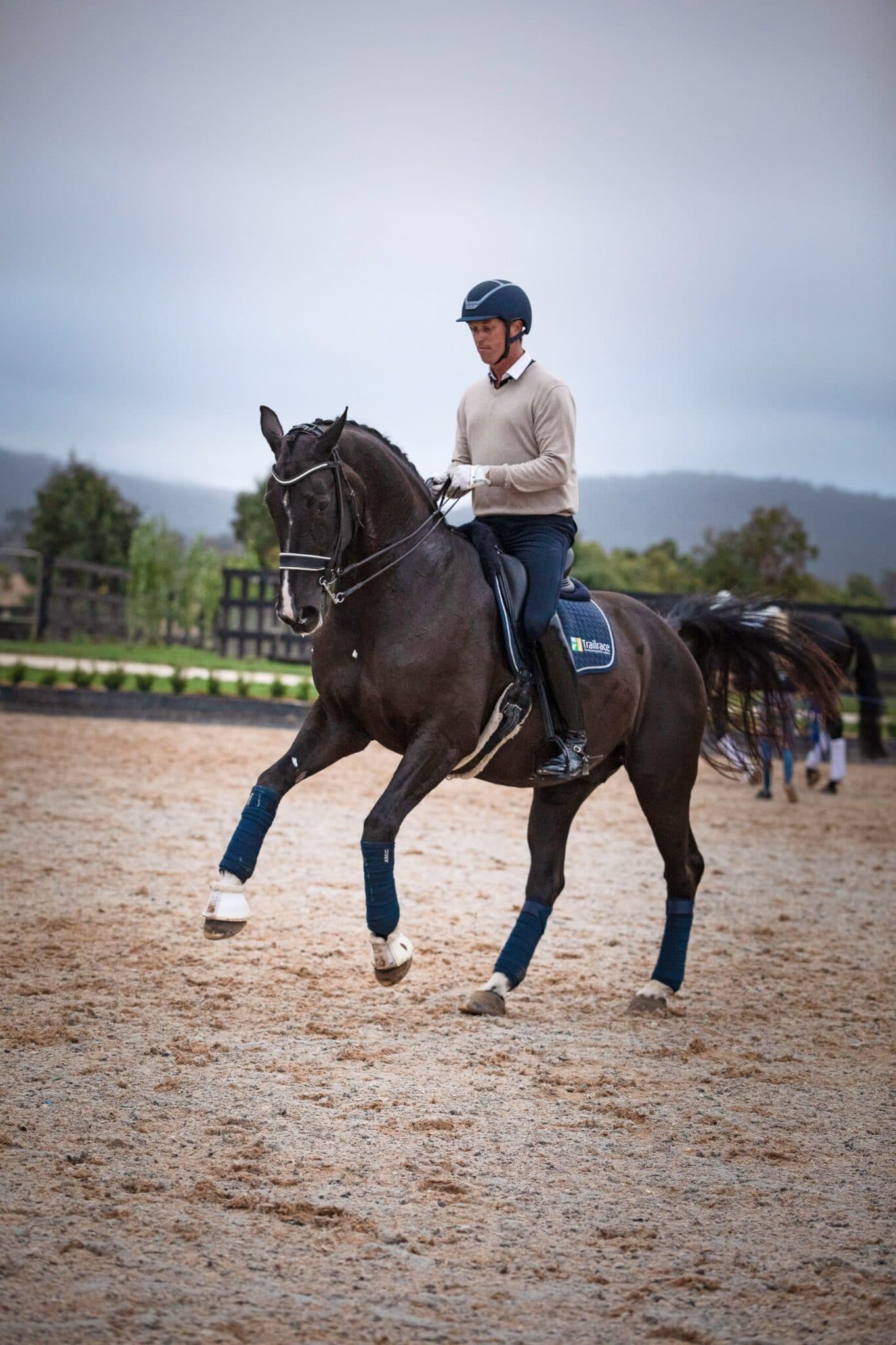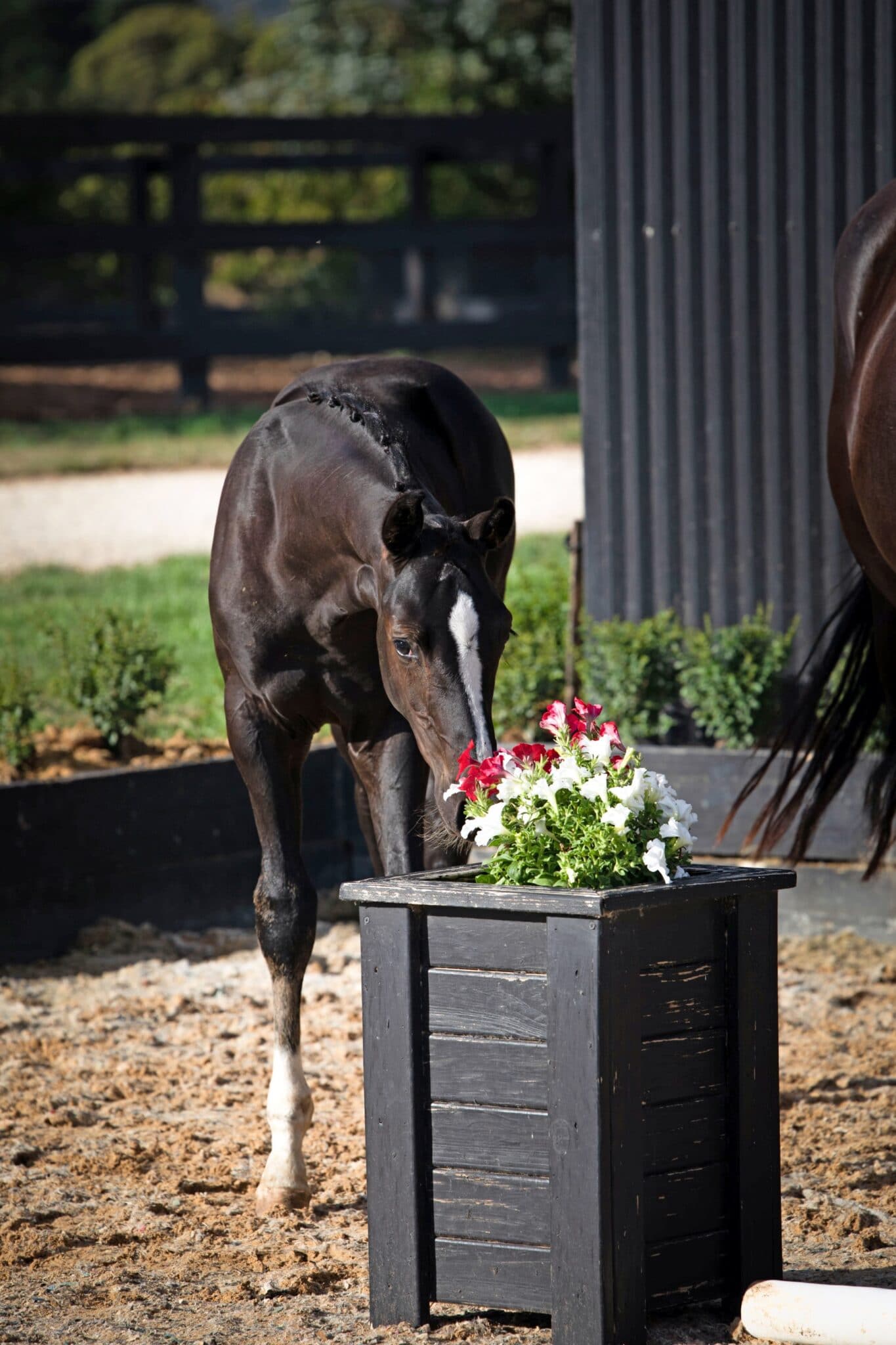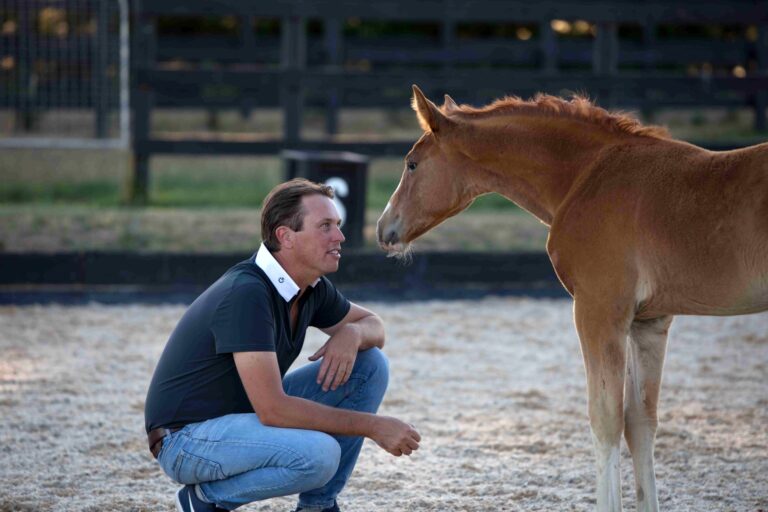Elite Australian dressage rider and highly sought after trainer, DAVID SHOOBRIDGE shares some top tips in this exclusive two-part series on building a respectful relationship with your horse.
No time to read? Our VIPs can LISTEN to this article on our Podcast now.
As a rider and breeder, I’m often asked about training tips, or the type of mare to cross with a certain stallion, or questions about my own riding. But it’s not often documented as to just how we build respectful relationships with our young horses! When do we start? What do we expect? What can go wrong? What can be done well?

The following article will hopefully shed some light onto the day-to-day process of handling all our horses both on and off our home property, and from that point, how we manage, respect and develop the relationship with our horse.
Whist the general principles of horse handling are consistent from the time they’re born until the time they leave us, there are small changes and lessons to be learned for every situation. For simplicity, I have broken the stages into the lifecycle of the horse.
Broodmares
This is where all the magic happens! These lovely ladies are the creators of our equine life and need to be understood. Generally, mares run in herds, which means they have a defined order of social status within their herd and they develop social boundaries.
With this in mind, any changes to the dynamics will see friendships challenged, social groups adjusted, and authority questioned. It sounds a little like the school yard, doesn’t it! We need to remember that horses are herd animals – they have their ‘squad’ and it’s really important that we understand that the less disruption to this, the better.
The only time these relationships fall by the wayside is when the mares have their foals. Over the course of the latter stages of pregnancy, they will generally become a little aloof from the herd and prefer their own space. Maybe they know what parenting is all about and they’re trying to get their ‘me time’ in before it’s seemingly lost! Understand this and allow the mares to foal down in their own private space, close to their herd, but unchallenged by other horses.
Foals

The relationship building continues with the foal. From an early age, it’s important to ensure the foal is relatively comfortable in our company. They shouldn’t be treated like the family dog, but it’s great if they have an understanding of our expectations. It’s this stage of life where they learn to lead, learn about personal space, and learn about independence.
In our stable, we lead the foals with a lead rope attached to the halter, and a long rope around their rump and threaded through the halter. In theory, the rump rope gives us the accelerator, the halter rope gives us the brakes. In an ideal world, both ropes have very little pressure … but in reality, the first few leading sessions will result in both ropes getting a fair workout! Wear gloves and sturdy boots, and a helmet is desirable.
Handling the youngsters can be a challenge at times. For the parents out there, relate it to those pre-teen years. Opinions are formed and personalities are evident. It’s our job to give these youngsters a great understanding of what we’re going to expect of them as riding horses.
Growing Up
The next stage in life for these adolescents is that massive transition from being a paddock ornament to a riding partner. It is so important that this stage in the training process is done with respect, care and diligence, as it’s one of the times in their lives where we can make or break our dreams for them!
In starting any youngster, one of the first lessons is personal space. The horse should be confident in their own space and not intrude into yours. Step them back, make them stand. Try not to hold pressure on a rope or rein, and, biggest of all, try not to hold pressure, tension or anxiety in yourself. These guys are extremely intuitive and will detect any signal or message from you whether it’s intended or not.
David’s Tips for Developing a Respectful Relationship
From that point onwards, my top tips for developing a respectful relationship are these:
1. Have a ‘system.’ A system in this instance is a strategy that you can repeat over and over again in the same way. You ask for a reaction using the same trigger/aid and reward a consistent reaction. We are often told that horses are animals that learn through repetition. What would you say if I completely agreed? I believe they are absolute creatures of habit. Build or adopt a system that you understand, or are willing to understand and stick to it. Sure, adopt learnings from other situations, systems or theories, but as a fundamental rule, your principles should remain very consistent. Have the confidence in your system and your approach. This will form a really solid baseline of respect with the horse as there’ll be no surprises! With a good system, you’re not over facing, over stimulating or compromising the well-being of the horse.
2. Emotive responses don’t help. Be brave and big enough to say ‘I’ll come back to this’ if things aren’t going your way. Revisit step one and stick to it!
3. Personal space is important. You need your space, your horse needs theirs. Developing a respectful relationship will help you as a combination. Your space is important, and your horse’s confidence will grow as they become more comfortable in their own space. Make them happy, secure and calm by … you guessed it … following your system!
4. Be rational, confident and follow your system. Now, from time to time situations happen when things just go wrong. Keep calm, and seek help from a mentor or instructor with whom you have a relationship. Above all, be rational, be confident and follow your system!
In Summary
When we’re riding or handling our horses, we are in charge of the development of two beings: the horse and ourselves. We’re always learning, and so too are they. And what they’re learning is either good or bad with nothing much in between. So make sure you understand the lessons you’re going to teach, plan your rides, think about what you need to achieve, and ask yourself if you’ve done all that’s necessary to facilitate the learning.
For news of clinics, events and horses for sale, visit www.davidshoobridge.com.au.
Coming Up…
Christine Armishaw asks David our burning questions off the back of this article in an insightful Q&A, where David shares his thoughts on breeding, temperament and the point where he knows he is working with a ‘special’ horse. Coming to our VIP area soon…



